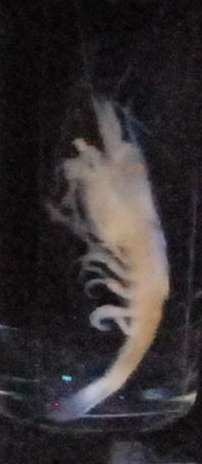Troglocaris anophthalmus
Troglocaris anophthalmus is a species of freshwater shrimp in the family Atyidae. It lives in karstic caves in Bosnia and Herzegovina, Croatia, Italy and Slovenia.[1] Although morphologically similar across its 500-kilometre (310 mi) range, molecular phylogenetics suggests that there are four or five cryptic lineages with more restricted ranges, although one such lineage does range unusually widely for a troglobite – over 300 kilometres (190 mi).[3]
| Troglocaris anophthalmus | |
|---|---|
 | |
| Scientific classification | |
| Kingdom: | |
| Phylum: | |
| Subphylum: | |
| Class: | |
| Order: | |
| Family: | |
| Genus: | |
| Subgenus: | Troglocaris |
| Species: | T. anophthalmus |
| Binomial name | |
| Troglocaris anophthalmus (Kollar, 1848) | |
| Synonyms [2] | |
| |
Like other underground-living animals, this shrimp lacks pigment (appearing whitish) and eyes. The carapace length is typically about 0.5–0.9 cm (0.20–0.35 in).[4]
It was originally described by Vincenz Kollar as Palaemon anophtalmus (a misspelling of "anophthalmus"), but this name was considered to be a nomen nudum for a long time. This name is, however, accompanied by a description, and predates Dormitzer's junior synonym Troglocaris schmidtii.[2]
References
- De Grave, S. 2013. Troglocaris anophthalmus. The IUCN Red List of Threatened Species 2013. Downloaded on 14 June 2016.
- L. B. Holthuis. "Nomenclatural notes on European macrurous Crustacea Decapoda" (PDF). Zoologische Mededelingen. 27: 312–322.
- Valerija Zakšek, Boris Sket, Sanja Gottstein, Damjan Franjević & Peter Trontelj (2009). "The limits of cryptic diversity in groundwater: phylogeography of the cave shrimp Troglocaris anophthalmus (Crustacea: Decapoda: Atyidae)" (PDF). Molecular Ecology. 18 (5): 931–946. doi:10.1111/j.1365-294X.2008.04061.x. PMID 19207253.CS1 maint: multiple names: authors list (link)
- "Troglocaris (Troglocaris) anophthalmus anophthalmus (Kollar, 1848)". Plazi. Retrieved 11 February 2018.
External links

- Charles Fransen (2011). "Troglocaris (Troglocaris) anophthalmus anophthalmus (Kollar, 1848)". WoRMS. World Register of Marine Species.
Further reading
- Vincenz Kollar (1848). "Ueber ein neues sehr merkwürdiges Crustaceum aus den unterirdischen Gewässern von Krain, welches Herr Custos H. Freyer an das k. k. Hof-Naturalien-Cabinet eingesendet hat". Sitzungsberichte der Mathematisch-Naturwissenschaftliche Classe der Kaiserlichen Akademie der Wissenschaften. 1: 137–138.
